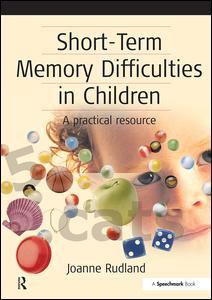Short-Term Memory Difficulties in Children A Practical Resource
Auteur : Rudland Joanne

Children who have low self-confidence; a negative attitude towards school; score below average on assessments of language comprehension; and have an erratic pattern of errors with no specific linguistic weaknesses on assessments of comprehension, may be suffering from short-term memory difficulties.
Written by a practising speech language therapist, this book provides a structured yet flexible approach to addressing the needs of children with short-term memory difficulties. Short-term memory therapy can be of great benefit with very positive results. Memory therapy can have a direct and positive impact on a child's receptive language skills, self-confidence and ability to learn.
This practical resource provides a complete programme of ideas for developing a child's short-term memory skills. The programme can be administered in its entirety, or as an accompaniment to clinician's existing packages of care and is best suited to individual intervention. The structured programme is intended for individual therapy, although activities may be adapted for group therapy. Containing photocopiable activity sheets and supporting material, ideal for use with 7 to 11 year-olds, the book also includes child-friendly recording forms and progress charts.
Although written primarily for speech language therapists, this book will prove useful in teaching and practising memory strategies for learning support assistants, teachers, educational psychologists and anyone working with school-aged children.
Date de parution : 08-2014
21x29.7 cm
Thème de Short-Term Memory Difficulties in Children :
Mots-clés :
Short Term Memory Difficulties; visuo; Central Auditory Processing Disorder; spatial; Working Memory Test Battery; sketch; Learning Skills Centre; pad; Instruction Sheet; phonological; Visuo Spatial Sketch Pad; store; Bingo Cards; specific; Phonological Store; language; TTM; impairment; Instructions Score; loop; Ch Ic Ke; Child’s Educational Placement; Working Memory Model; SENSORY MEMORY STORE; Phonological Loop; Auditory Processing Disorder; Articulatory Control; M O Ry; C Hi Ne; Bi Ng; Specific Language Impairment; Fo Llo W; Ac Tiv Ity; Correct Responses Score; IC TU



